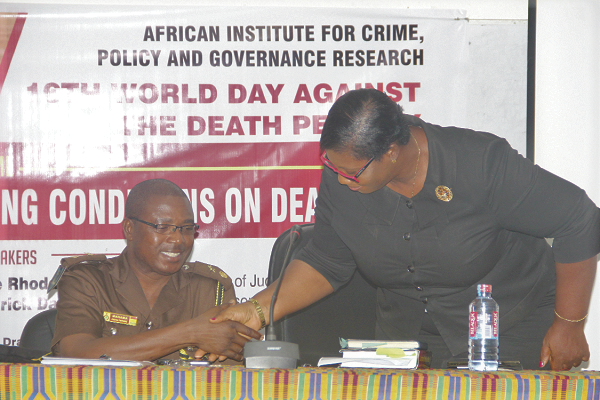
Ghanaians want death penalty expunged from justice system — Survey
A survey conducted by the African Institute for Crime, Policy and Governance Research (AFRICPGR) has revealed that majority of Ghanaians want the death penalty expunged from the criminal justice system.
Findings of the survey, which were presented at a workshop at the University of Ghana, Legon, yesterday, showed that of the 2,460 views sampled, 48.3 per cent of the respondents supported calls for the abolishing of the death penalty while 19.7 per cent were in favour of its retention.
For those who disapproved of the sentencing of persons convicted by the courts to death either by hanging or firing squad, they recommended the replacement of that sentence with other forms of punishment such as life imprisonment.
Workshop
The survey was led by two directors of the AFRICPGR, Dr Kofi E. Boakye and Dr Justice Takebe, and was presented to students of the University of Ghana as part of activities marking the 16th World Day of the Death Penalty, which was on the theme: “Living conditions on death row”.
The findings were presented by a lecturer at the Institute of Psychology at the University of Ghana, Dr Francis Annor.
Advertisement
Death row
Taking the participants through conditions in Ghana’s prisons, a Deputy General Staff Officer of the Ghana Prisons Services, Chief Superintendent of Prisons Mr Thomas Mahama, said Ghana’s prisons were currently holding a total of 170 persons on the death row, including seven women.
They were all sentenced to death for murder.
He said Ghana had not executed convicted persons on death row since July 17, 1993, after the execution of some 19 prisoners on that day.
In recent years, he said, some persons on death row had had their death sentences commuted to life imprisonment after 10 years in custody, while others had been given 20-year terms. Others were also released through amnesty granted by the President.
He admitted that persons on death row went through trauma and stress as “they do not know when they will be executed”.
Mr Mahama suggested that such persons be given the needed attention to reduce the trauma and stress they went through if abolishing of the death penalty was not enforced in the near future.
Challenges
A lawyer and advocate for the abolishment of the death sentence, Ms Joyce Adu, who chaired the function, said the death penalty was enshrined in the Constitution of Ghana and was recognised by the courts.
She expressed concern that although Ghana was among the countries that had abolished the execution of prisoners on death row, it was yet to stop sentencing convicts to death by getting rid of the punishment from its legal system.
“Death penalty was to serve as a punishment that would deter others but it has not been effective as murder cases have not reduced over the years,” she said.
Many death row inmates, she said, did not receive adequate legal representation for their trials even though they had a right to a government-appointed lawyer.
